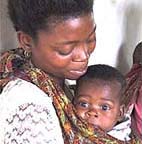|
||||

|
|
||||||||||||||||||||||||||||||||||||||||||||||||
|
Identifying long-term financing options
The Task Force’s contribution The GAVI Financing Task Force is committed to identifying options and assessing strategies, which will improve the capacity of governments, donors, development banks and others to mobilize funds required to finance the improvement and expansion of national immunization programmes. Immunization, as one of the most cost-effective interventions known, is a critical component of a well-functioning health system. Sustainable financing for immunization must be considered within the context of overall health sector and national budgets. The Vaccine Fund is a new source of support for countries with a GNP/capita of less than or equal to $1000. The Vaccine Fund’s current budget allows for five years of support (although countries may elect to spread this support over a longer term). It is fully anticipated that successful use of the Vaccine Fund’s resources will pave the way for a replenishment of the Vaccine Fund, permitting countries to introduce the next generation of life-saving vaccines to their programmes. In order to encourage a gradual assumption of the financial responsibility for programme improvements, countries that receive funds for new vaccines or to improve their vaccine delivery systems through the Vaccine Fund are expected to provide mid-term plans for financial sustainability to the GAVI Board. These plans, which are to be signed off by the Ministry of Finance, will detail the long-term financial sustainability strategies for the country’s immunization programme when initial support from the Vaccine Fund ceases. Countries with approved plans will be eligible to receive their next installment of Vaccine Fund support. The FTF is responsible for the development of guidelines, indicators, and targets for countries to consider when drafting their financial sustainability plans.
|
||||||||||||||||||||||||||||||||||||||||||||||||
| Contact GAVI | Guestbook | Text version | Credits and Copyright | ||||||||||||||||||||||||||||||||||||||||||||||||
